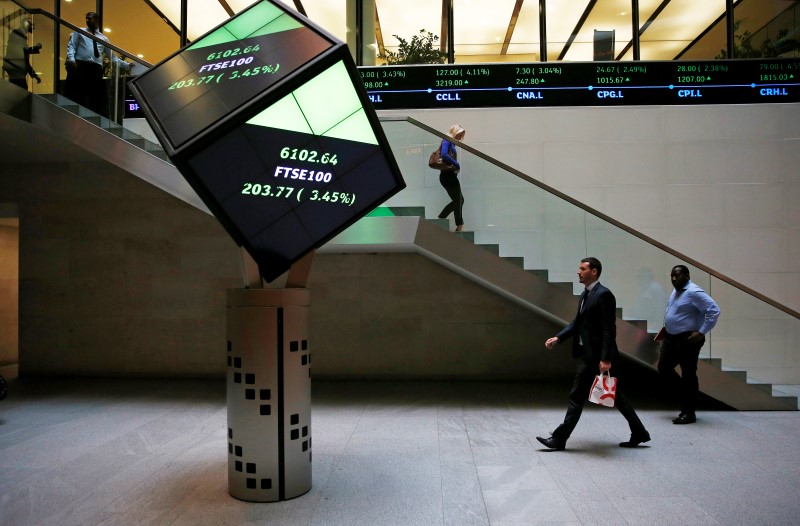By Alistair Smout and Atul Prakash
LONDON (Reuters) - More than 30 billion pounds were wiped off British blue chips on Thursday after China allowed its currency to weaken faster than before, rocking global markets and sending commodity shares to their lowest levels for about a decade.
However, the index ended off of its lows after China suspended a circuit-breaker on its stock market that traders said was causing - rather than preventing - volatility.
The commodity-heavy FTSE 100 hit a three-week low and closed down 119.30 points, or 2 percent at 5,954.08 to wipe 33 billion pounds off the index's market capitalisation.
UK mining and energy shares hit their lowest level in more than 11 years, with metal and crude oil prices knocked by concerns that major consumer China's economy is even weaker than anticipated.
China allowing a big fall in the yuan sent regional currencies and stocks tumbling. The offshore yuan hit a record low and local stock markets were suspended less than half an hour after opening, the second emergency suspension this week.
The FTSE 100 has seen a near 5-percent fall so far this week, which would be its biggest weekly drop since last August, when China weakened its currency and sent markets into a similar tailspin.
"Similar to last August-September, doing the most damage is not the fact that the Chinese economy is continuing to struggle to turn things around ... but rather the uncertainty going forward in regards to how much will they devalue the yuan," City of London Markets trader, Markus Huber, said.
The FTSE 350 Mining and Oil and Gas indexes fell 4.7 percent and 2.3 percent respectively.
Shares in Anglo American (L:AAL), Glencore (L:GLEN) and BHP Billiton (L:BLT) fell 5-11 percent, while emerging market-exposed Aberdeen Asset Management dropped 7.8 percent.
However, oil majors BP (L:BP) Group and Royal Dutch Shell (L:RDSa) ended the session off their lows as oil prices steadied.
The market was also supported by China's decision to suspend its circuit-breaker.
"The positive initial reaction in developed markets would suggest the circuit breaker suspension in China could act to calm Chinese markets rather than just spur even bigger daily price declines," CMC Markets market analyst, Jasper Lawler, said in a note.
Elsewhere, Poundland slumped nearly 10 percent after the British discount retailer said there were fewer shoppers over Christmas, meaning profits would come in towards the lower end of forecasts.
"November's highly cautionary interim statement, followed by an atrocious weather hit to High Street footfall during the run-up to the crucial Christmas trading period, was bound to result in a profit warning," Beaufort Securities analyst, Barry Gibb, said in a note.

The falls had been overdone, he said, and Beaufort raised its recommendation on the stock to "buy" from "sell".